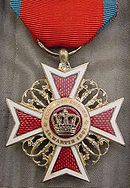.gif)
Order of the Crown (Romania)
Encyclopedia
The Order of the Crown (of Romania) is a chivalric
order set up on 14 March 1881 by King Carol I of Romania
to commemorate the establishment of the Kingdom of Romania
. It was awarded as a state order until the end of the Romanian monarchy in 1947.
 The religious character of the model of 1881 is a red-enamelled, eight-pointed Maltese Cross
The religious character of the model of 1881 is a red-enamelled, eight-pointed Maltese Cross
with wider margin of gold and white. In the angles of the cross were "C"s, the initials of the founder. The medallion in the middle of the cross shows a royal crown on dark red background. The medallion is surrounded by a white-frost edge surrounded the inscription PRIN NOI INSINE (by ourselves) and the order's foundation date of 14 March 1881. On the back of the medallion is the day of the statute as well as the years 1866 (referendum), 1877 (complete Romanian independence), 1881 (proclamation of Carol as King of Romania).
Chivalry
Chivalry is a term related to the medieval institution of knighthood which has an aristocratic military origin of individual training and service to others. Chivalry was also the term used to refer to a group of mounted men-at-arms as well as to martial valour...
order set up on 14 March 1881 by King Carol I of Romania
Carol I of Romania
Carol I , born Prince Karl of Hohenzollern-Sigmaringen was reigning prince and then King of Romania from 1866 to 1914. He was elected prince of Romania on 20 April 1866 following the overthrow of Alexandru Ioan Cuza by a palace coup...
to commemorate the establishment of the Kingdom of Romania
Kingdom of Romania
The Kingdom of Romania was the Romanian state based on a form of parliamentary monarchy between 13 March 1881 and 30 December 1947, specified by the first three Constitutions of Romania...
. It was awarded as a state order until the end of the Romanian monarchy in 1947.
Classes
The order had five classes, most of them with limited numbers:- Grand Cross (limited to 25)
- Grand Officer (limited to 80)
- Commander (limited to 150)
- Officer (limited to 300)
- Knight (unlimited numbers)
Decoration

Maltese cross
The Maltese cross, also known as the Amalfi cross, is identified as the symbol of an order of Christian warriors known as the Knights Hospitaller or Knights of Malta and through them came to be identified with the Mediterranean island of Malta and is one of the National symbols of Malta...
with wider margin of gold and white. In the angles of the cross were "C"s, the initials of the founder. The medallion in the middle of the cross shows a royal crown on dark red background. The medallion is surrounded by a white-frost edge surrounded the inscription PRIN NOI INSINE (by ourselves) and the order's foundation date of 14 March 1881. On the back of the medallion is the day of the statute as well as the years 1866 (referendum), 1877 (complete Romanian independence), 1881 (proclamation of Carol as King of Romania).
Other
The Order's sash or ribbon is light blue with two silver stripes. Grand Cross members wore the decoration on a sash from the right shoulder to left waist, Grand Officers and Commanders around the neck and Knights and Officers on the left breast. For the two highest classes of the order an eight-pointed silver star was also worn on the left breast, Grand Cross members wearing it as an order-insignia and Grand Officers as a medallion, surrounded by 4 royal crowns since 1932.Recipients
- Jean-Baptiste BillotJean-Baptiste BillotJean-Baptiste Billot - 31 May 1907, Paris) was a French general and politician.-Life:Jean-Baptiste Billot entered the École spéciale militaire de Saint-Cyr in 1847, and on leaving it in 1849 joined the staff with the rank of sous-lieutenant...
- Josef HarpeJosef HarpeJosef Harpe was a German Generaloberst who served during World War I and World War II. He was also a recipient of the Knight's Cross of the Iron Cross with Oak Leaves and Swords...
- William HorwoodWilliam Horwood (police commissioner)Brigadier-General Sir William Thomas Francis Horwood GBE KCB DSO served as Commissioner of Police of the Metropolis, head of London's Metropolitan Police, from 1920 to 1928.-Military career:...
- August KanitzAugust KanitzAugust Kanitz was a Hungarian botanist . While a student at the University of Vienna he wrote Geschichte der Botanik in Ungarn , and soon after, Versuch einer Geschichte der Ungarischen Botanik...
- Hendrik Pieter Nicolaas MullerHendrik Pieter Nicolaas MullerHendrik Pieter Nicolaas Muller, GON, RNL, FRGS was a Dutch businessman, diplomat, world traveller, publicist, and philanthropist...
- George Julian ZolnayGeorge Julian ZolnayGeorge Julian Zolnay was a Romanian and American sculptor called the "sculptor of the Confederacy".-Early years:Zolnay was born on July 4, 1863 to Ignatius and Carolina Vagan Zolnay...
- Erich AbrahamErich AbrahamErich Abraham was a German general of Infantry, serving during World War II. Abraham commanded the LXIII. Armeekorps on the Western Front in 1945. He was also a recipient of the Knight's Cross of the Iron Cross with Oak Leaves...
(commander class) - Radomir PutnikRadomir PutnikRadomir Putnik, also known as Vojvoda Putnik, OSS OCT OKS GCMG was a Serbian Field Marshal and Chief of General Staff in the Balkan Wars and World War I, and took part in all wars that Serbia waged from 1876 to 1917.-Biography:...
- Živojin MišićŽivojin MišicŽivojin Mišić OKS GCMG was a Vojvoda and the most successful Serbian commander who participated in all Serbia's wars from 1876 to 1918.-Early years:Misic's grandfather was born in Struganik near Mionica...

